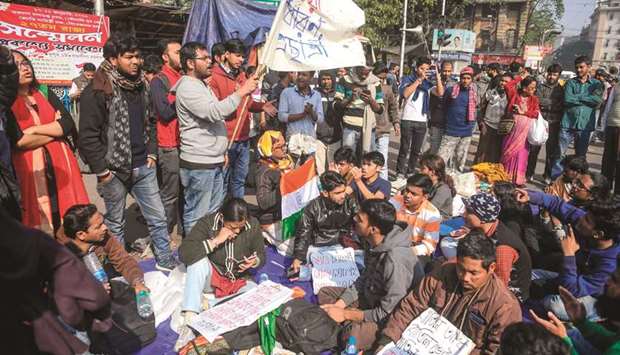Prime Minister Narendra Modi yesterday alleged some political parties were not ready to understand the new citizenship law, and continued to fuel misconception about a legislation which provides citizenship and not snatch it from people.
Speaking on the occasion of the 157th birth anniversary of Swami Vivekananda at the Belur Math – the global headquarters of the Ramakrishna Math and Ramakrishna Mission - Modi said youth and other citizens of the country are being misled on the Citizenship Amendment Act which came into force last almost a month after parliament passed the law on December 11.
“The CAA is a law to provide citizenship, it does not snatch citizenship. The government is providing citizenship through the law, it is not taking away the citizenship of anyone,” Modi said at the Math, in Howrah district close to Kolkata.
Swami Vivekananda’s birth anniversary is celebrated as National Youth Day across the country.
“Some political parties are not ready to understand CAA, they are fuelling misconception,” the prime minister said.
“What is there in this Act? Why was it needed? There are a lot of questions in the minds of the people which have been fuelled by various people. Most people have a sense of awareness,” Modi said.
“But there are some who are victims of misconception and rumours. It is our responsibility to make these people understand. It is our duty to clear their doubts on this issue.”
The prime minister said that the CAA provides citizenship to those migrants who faced persecution in the name of religion in Bangladesh, Pakistan and Afghanistan.
“It’s not that we came up with a new law overnight. The people who believe in the constitution of India will be given citizenship on the basis of certain legalities.”
Earlier, police baton-charged protesters to stop them reaching Modi’s car as nationwide protests against the citizenship law entered a second month.
Tens of thousands staged protests through the night in Kolkata to denounce Modi’s weekend visit.
Police said they were forced to act after protesters tried to storm past barricades to stop Modi’s vehicle outside a stadium, where he again defended the law and insisted the demonstrators were “misguided”.
Nearly 2,000 protesters gathered outside chanting “Fascist Modi, Go Back” before the showdown between demonstrators and police.
More than 100 protesters were detained, a police official said.
Protesters have burned effigies of the prime minister during his visit and brandished black flags - considered an insulting gesture in Indian society.
“The government can’t suppress our voice. We are not afraid. We are determined to fight for our rights,” Samit Nandi, one of the protesters, said.
“We will continue our protests until Modi leaves our city.”
West Bengal has become a political battlefield between Modi’s Bharatiya Janata Party (BJP) and the state’s ruling Trinamool Congress party.
Chief Minister Mamata Banerjee is among state leaders nationwide who have said they will not implement the CAA.
Opponents say the government has created a religious test for citizenship in the secular country.
Many among India’s 200mn Muslims fear the law is a precursor to a National Register of Citizens that could leave them stateless.
Many poor Indians do not have documents to prove their nationality. Widespread demonstrations have rocked the nation since the law was approved by parliament last month.
At least 27 people, mostly Muslims, have been killed with police accused of using disproportionate force in several states.
Home Minister Amit Shah also held a rally in Jabalpur yesterday to build support for the law and several hundred supporters of the measure marched in New Delhi.
But in a new sign of international unease over the law, a third Bangladesh minister cancelled a visit to Delhi in apparent protest.
Deputy Foreign Minister Shahriar Alam was to have attended a diplomatic symposium in the Indian capital this week.
Foreign Minister A K Abdul Momen and Home Minister Asaduzzaman Khan called off separate visits in December.
The government has denied any link to the new law, however.
The United Nations and a US government religious freedom commission have also expressed concern.

Students shout slogans to protest against Prime Minister Narendra Modi, during a demonstration in Kolkata yesterday.
